Deciding to Enter into Marriage
Archpriest Pavel Gumerov
In this cycle of conversations on “The Grammar of family life” Archpriest Paul Gumerov speaks on how marriage is understood in the Orthodox Church, on what foundations it should be built, what kinds of problems people will face in family life, and how they can avoid or overcome them.
The first conversation in the cycle is devoted to problems that young men and women ask themselves as they consider marriage: what is the purpose of marriage from the point of view of a Christian, how to choose a partner in life, whether to blindly succumb to the feeling of infatuation, whether they should necessarily get married, and whether marriage with the heterodox and others is possible for an Orthodox Christian.
The first rule of marriage: “It is more blessed to give than to receive”
Hello, dear friends. The theme of our meeting today is the decision to enter into marriage. People who want to start a family come to me, as to any priest, quite often, and it’s wonderful. The family is one of the most beautiful creations of God. It is not good for man to be alone (Gen. 2:18) says the Lord. We are fulfilling the commandment of God when we want to create a family, and enter into marriage.
I think every person who doesn’t want to take up monasticism, that is, to strictly serve God in the monastic rank, should, of course, contemplate creating a family. But often enough it turns out that people are not able to start a family, and they are not always women. It’s known that women are more family-oriented, and the desire to start a family is, as a rule, stronger in them than in men, especially in the modern world—but we have more women than men in Russia. And, oddly enough, not only women remain single, unable for years to find their familial happiness, but men also. Men thirty to forty years old, who have no visible barriers to starting a family, come to me. These were people successful in life, well-brought up, with very pleasing looks, working, having received a good education… But they said they couldn’t decide, couldn’t find that one girl with whom they could go through life; or somehow they can’t communicate well with the opposite sex.
Of course, there are various reason for this. Men of thirty to forty years, it would seem, meet all the conditions and have all the qualifications for starting a family. But it often happens that the reason they can’t do it lies within—an internal reason. One man is internally unprepared for family life; he incorrectly understands family life. He, maybe, had no such experience, no example from his parents: he was raised by a single mother or his father paid no attention to the family, and maybe he some saw conflicts in his family, or disorder, which now prevent him from forming a correct image about how a modern family should look. It’s one kind of immaturity about which Met. Anthony of Sourozh speaks, having written many fantastic books on family life. And although Met. Anthony himself was not a family man, he had great spiritual experience.
People, unfortunately, don’t really understand what a family is—it is first and foremost a ministry; it’s the desire to give someone your love: It is more blessed to give than to receive, as it says in the Acts of the Apostles. It’s great toil in the name of another person—a desire to make them happy, and not simply to receive from them some kind of “simple womanly happiness” or “simple manly happiness.”
Many call society itself, in which we live, a consumer society, a hedonistic society. We are all oriented towards consumption, towards entertaining people; and people, often raised in an incomplete family, don’t have experience in serving other people: for them everything revolved around themselves. The head of the family in which this person grew up wasn’t even the man, not even the wife, but the child—he himself, around which the family built its life. And such a person is either searching for a woman who will serve him that way, and not him serve her, or he is simply generally not focused on the fact that marriage requires serious work.
Our talks, I hope, will help people find familial happiness, and the answers to the questions that are important to them to prepare themselves for family life… And these talks, of course, are first and foremost aimed at those people who want to start a family, who have as yet not started one; however it will be interesting for family people to listen to these talks too, in order to sort out some important questions and disputes that they have in their family life.
The closest people
What do the Holy Scriptures say about starting a family? We already noted the commandment, It is not good for man to be alone. Therefore the family is the creation of God. As Blessed Augustine said, “it is a shard, a remnant of Paradise on earth.” We know we cannot create Paradise on earth. That which the Communists offered us is a utopia. And such efforts usually end in a concentration camp: people who want to live better necessarily appear, grasp at something, and they begin to oppress others. How is it that families can be different? Because family life is built not on principles of joint effort, or business, or on the oppression of one person by another, but on the principles of love. It’s by love precisely that you can find Paradise and peace in your soul and find Paradise in a single family community.
Holy Scripture also says to us: and they twain shall be one flesh… What therefore God hath joined together, let not man put asunder (Mt. 19:5-6). Mankind was created immediately as a family unit, as units of society, in which people’s lives are built on the principles of love; and in marriage they should become one soul and one body. Why did the Apostle Paul in his Epistle to the Ephesians, which is read in the Mystery of Matrimony, call marriage a mystery: This is a great mystery (Eph. 5:32)? Because marriage, even if it’s not crowned[1] but is concluded by law, is always a mystery. Imagine: two people of different upbringings, from completely different families (that is, they shouldn’t be blood relatives, by definition), man and woman—inherently two very different creatures meet and become the closest, immediate family—such that a closer one doesn’t exist! They are even closer than children and parents, because parents and children are the first degree of kinship, but man and woman in marriage, husband and wife, is the zero-degree of kinship. Closer can’t even be conceived of. Even our secular, completely non-ecclesiastical laws have some points saying that husband and wife are the closest relatives. It concerns, for example, inheritances and other material points. And modern people, unfortunately, often don’t understand the mystery of this closeness. They consider that if a guy and a girl love one another it’s enough, and no formalities are necessary to begin living together, and this “great love is more than enough for us,” so that it’s a marriage. No, that’s no kind of marriage and no kind of family, because a family is when two people become one whole, the closest, the very closest of kin to one another, before one another, before God, and before the law.
When marriage is impossible
What kinds of obstacles to marriage exist? Indeed, not every person can start a family—not for those reasons I talked about in the beginning, but because of their ineptitude for family life or because it is impossible for some reason. First is an already-existing marriage. A man, finding himself in marriage, can’t begin a new family: he’s not free. Polygamy is not allowed by law here in Russia—even in traditional Islamic regions polygamy is outlawed. You can start a family only with one person.
There are rules concerning particularly Christians. Many people, especially girls, want to start a family with a person of a different faith—another Christian confession or even an altogether other religion, for example with a Muslim. Such problems are often encountered. The rules of the Church categorically reject such marriages. For example, Canon 72 of the Sixth Ecumenical Council says that to unite in marriage is impossible in every case not only with a non-Christian, but even with a heterodox Christian, that is, with those aren’t Orthodox Christians, confessing some sort of heresy, but yet calling themselves Christians. Until the era of Peter I in Russia no one was crowned, no one concluded a marriage with a heterodox—with a Catholic, a Protestant or other non-Orthodox Christians. Under Peter a “window to Europe” was hacked open, and a flood of foreigners came to Russia to serve and work, and the problem of mixed-marriages began to appear. Under certain conditions it was permitted to conclude such spousal unions. What conditions? Spouses should be crowned only in the Orthodox Church and children should be raised according to Orthodox Tradition, even if the husband—the head of the family—was, for example, a Lutheran. Again, such marriages appeared only in the eighteenth century from the times of Peter.
What kinds of age restrictions are laid upon Orthodox Christians? The same as are defined by the laws of our state. If people have reached the marriageable age adopted by the state, they can marry. In 1830 the Holy Synod of the Russian Orthodox Church adopted a resolution according to which the marriageable age for men is 18 and for girls 16. In the Caucasus region slightly different ages were prescribed.
Kinship is also an obstacle to marriage. Marriage is categorically prohibited for any degree of direct kinship in any vertical branch: parents, children, grandparents, and so on. As for horizontal branches: brothers, sisters, uncles, aunts, nephews, cousins, second cousins and so on—it’s prohibited to enter into marriage up to and including the fourth degree of kinship. If it’s the fifth degree of kinship then usually you take the blessing of the diocesan hierarch, and then you can get married. But in modern cities such situations are very rarely met. Such familial considerations are more often met in rural areas, where relatives live not far from one another.
About spiritual kinship, which we enter into when we become Godparents of someone’s children … Such relationships also connect people, and in some situations marriages are not permitted. For example, a man, having become the Godfather of a woman’s child, cannot get married to this woman, if she becomes a widow. Here there isn’t a relation by blood, or by marriage, but these people are bound by ties of spiritual kinship.
Incapacity, caused by sickness, is also a barrier to concluding a marriage. If a man, on account of a psychological illness cannot perform some legal action (marriage is not only a spiritual institution, but also a state matter), he cannot enter into marriage, as well as if there is some physical disability towards marriage and the spousal life. We’re not talking about the inability to procreate, because procreation is not the sole purpose of marriage, but namely about the inability to enter into martial cohabitation.
Older, younger …
As concerns the age difference between the bride and groom, the canons don’t discuss it. Marriages, as we know, happen between different age groups; but speaking from my priestly experience, I think that the optimal situation is when the spouses are either peers, or of no more than a five year difference, especially if it’s the man who is five years older. If the woman is five years older it’s fraught with all kinds of negative consequences. It’s known that men age slower and their reproductive capabilities last much longer. When there is a difference between the husband and wife, for example, of ten-fifteen years, when they are still young, there isn’t a great impact: twenty and thirty-five. But the further along, the more temptations appear, and many people who not spiritually strong, and even those who are spiritually strong, can stumble on this. Therefore, it’s not banned, but all the same it’s common sense to avoid it.
What’s worth considering
I would like to switch to questions most often put forth in connection with this theme of getting married and starting a family.
—What should be the most important thing in deciding to get married? And isn’t there a risk in thinking too rationally about marital questions? After all, if we think, consider, and ponder everything beforehand, then it’s like we’re purchasing some item—for example, we’re deciding upon a cell phone, comparing options, functions, price, quality…
Naturally, in marriage we should shun such an approach. But to get married just because we like this person, because some kind of feeling welled-up, sparks flew between us, completely without thinking about whether this person has the qualities that are necessary in family life, without thinking about what kind of father he will be, what kind of mother she will be for our children—of course this we must not do, especially for a person who is planning to get ordained, for example. We had such a situation in seminary: one youngster was planning to get married to one young lady, but his classmates saw that this girl was totally secular and not ready to become a priest’s wife, a matushka, and unanimously advised him against taking this step. He got married anyways. It ended up quite sad, because after some time— actually pretty soon—they separated. This young man is now agonizing—he can’t get married a second time because he was ordained—although he isn’t to blame for the marriage disintegrating: the wife threw it away herself… And he didn’t become a priest; he remained a deacon, because of this as well, perhaps.
What qualities should we first of all look at in our future other half? The preparedness, as I already said, to get married, and the family of our chosen one. We must pay attention to what kind of family they come from. If they have some kind problem in their relationships with their relatives it could affect our marriage too. We’ll say more about this in the second talk.
Of course, every person has his requirements and criteria for choosing his co-traveler in life. But we, as rational creations, having reason from God, should all the same think seriously and imagine for ourselves what kind of qualities our chosen one, the mother or father of our future children, should possess.
Infatuation is not love!
—Infatuation and love—how not to confuse them? Is it important in the very beginning to wait for sincere love?
In short, I will say: infatuation and love, despite their outward appearances, are very different feelings. Infatuation has been very seriously medically studied. From infatuation, from this euphoria a person flies, as if on wings, has butterflies in his stomach, and has other kinds of purely bodily sensations … Even the composition of his blood changes. If you were to show him a picture of his beloved and immediately analyze his blood, it would become clear that he has elevated levels of certain substances. We know that hormones have a lot of influence on a person’s behavior. The brain produces dopamine, serotonin—“the happiness hormone,” in women oxytocin and in men testosterone. The hormonal field changes in a person and causes him to experience euphoria, like mild natural narcotics. If an infatuated person had an MRI, it would be clear that certain centers of his brain were working totally different. Of course, any sensible person understands that in marriage—ten-fifteen-twenty-twenty-five-fifty years—this won’t continue. In marriage there is something different—that which we call love. Love is a feeling of unity with our loved one, when their pain becomes our pain, their joy our joy, when you are willing to sacrifice something for this person, when you can’t live without them—not just because it’s pleasing for you to be with them, but when you are truly ready to give: It is more blessed to give than to receive.
—Is it necessary to be crowned? What if in the future the marriage suddenly falls apart, which is entirely possible? Isn’t it better after all to wait?
I think that for Orthodox people here the answer is unambiguous. Usually couples where one person is not very church-going ask this question. If speaking about Orthodox Christians, then their marriage should be crowned and blessed by the Orthodox Church—this is perfectly clear. But if one half is not ready to be crowned, then, I think, we should not drag and force them into it.
With that I would like to say goodbye until our next meeting, and to wish you all peace, joy, and love. May God protect you all!
[1] The wedding rite in the Orthodox Church includes the use of sacramental crowns that are placed over the heads of the bride and bridegroom by their sponsors. It symbolizes the martyrdom, or mutual sacrifice that married couple make. The Russian word, venchat, or “to crown” is used to describe the church wedding rite.


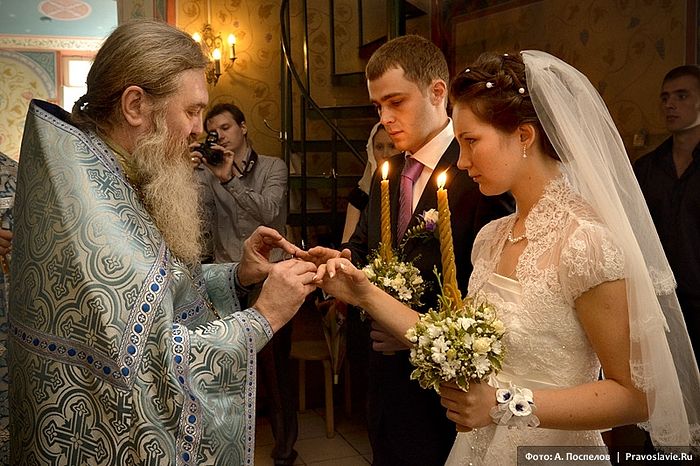
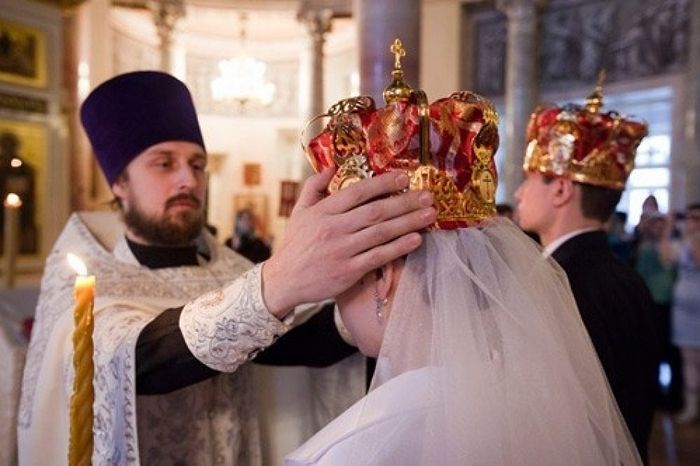
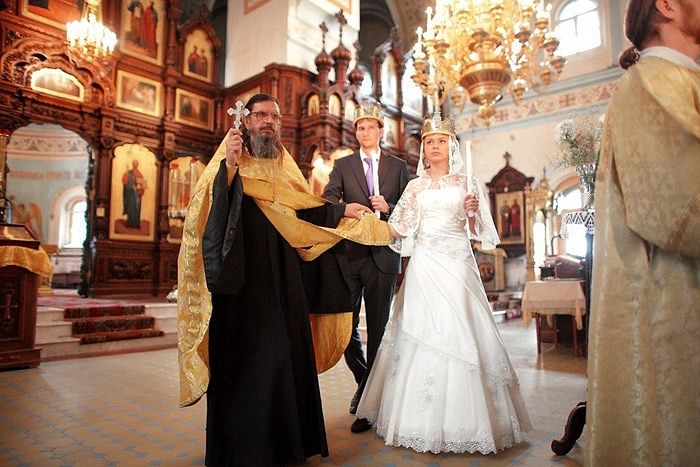

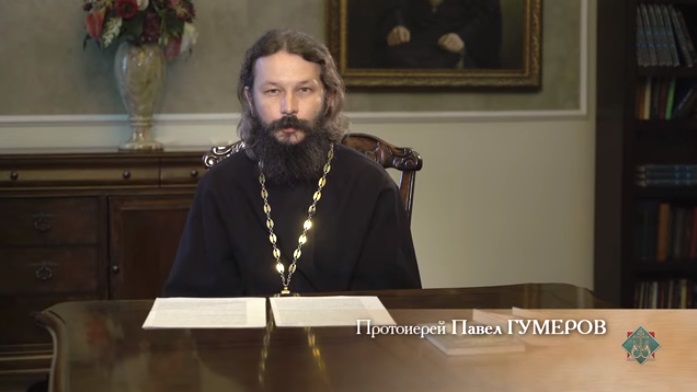



Relationships Before Marriage
Why is the candy and flowers phase of a relationship so important? What qualities are necessary for a future spouse—husband and wife? What must they discuss with one another? How to deal with the inadequacies of our chosen one?
Hello, dear friends! We are continuing our cycle of conversations on the family. Today’s theme will be familiarity and relationships before marriage.
A time of extraordinary happiness
The time of falling in love and of relationships until marriage is that amazing season hymned by many poets and authors. When psychologists ask people to imagine and demonstrate what a smitten man experiences, usually most people show on their faces a feeling of flying—as some soaring bird. Incidentally, when they ask people to imagine love, usually they call for their partner and hug him, to show that they are not alone and that love is precisely the desire to do something for another, to comfort him, to caress him. And falling in love is rather the sort of euphoria that a man experiences because it is pleasing for him to be eternally near the other.
Elder Paisios of the Holy Mountain said this attraction—infatuation—is also created by God, and not accidentally, because two completely different people become as one whole in family life, and their differences, their dissimilarities, which will be especially manifested in the first years of marriage, should be overcome by just such a mutual attraction. Otherwise, without mutual attraction, the elder says, no one would be able to start a family, because this is a very, very complicated matter.
Thus, today we will be speaking about the most common questions connected with the theme of relationships before marriage, of falling in love.
These relationships are extraordinarily important. But today, regretfully, the majority of people (I don’t mean Orthodox people, thankfully) begin family life by living together. They are united in a common household, in common affairs, and of course, passion—the sexual attraction they feel for one another. But thereby they have skipped over a very important, very necessary period—the period of preparation for marriage, for the pre-marital period is the dress rehearsal, it is a “school for young soldiers” before entering into marriage. People have much to learn, and must discuss many important points with their future spouses, get used to another person, learn to build a mutual relationship with one another, learn more about one another, learn to forgive and endure and love and gently relate to one another.
This period is a period of courtship. We sometimes call this the candy-bouquet period. A young man says some sweet words to a young woman, gives her gifts, takes her hand when she is getting off the bus … And everyone wants to do something for another. And when a relationship immediately begins with cohabitation, everything is as if turned on its head: the man, the future head of the family is not taking care of the girl, but more likely the girl is taking care of the man, because she has a very serious motive for the relationship: to go, in the end, with her companion to the justice of the peace so that their common-law marriage would end with a real marriage. And what kind of family head will this man be, if everything from the very start of the relationship revolves only around him, if his companion does everything for him, gives him everything, and he has no obligations of any kind? He doesn’t even have the incentive or desire to do anything for her or to serve her in any way!
The period of courtship helps people to unite, and to overcome the difficulties of the first years of marriage. How we will then remember this time! They’re the most amazing memories! And with what pleasure we will peruse our wedding photo albums then, with photos of your first joint trip on your honeymoon! I remember every time in our first year marriage when guests went to see even our distant relatives they would watch our wedding video, even, I admit, exhausting their guests with it. But to them it was apparently very important, although to others it was a little funny.
This time, the period of courtship, is always recalled with great gratitude and with some kind of nostalgia. And it’s very important, because in family life people should not forget about tenderness, about affection, about nurturing one another, and serving one another. And those who don’t forget about it preserve their familial happiness for many, many years.
If there’s a question of faith
Thus, a guy and girl meet, they like one another, they’re now dating, and even, maybe, are beginning to think about marriage. What issues need to be discussed before setting out to sea under the name of marriage? What should be found out about one another before the relationship becomes really serious? It’s a big mistake when people think that their companion possesses some kind of telepathic gift and will understand by himself everything you need and want. And those who think that as soon as they get on on the tracks of family life their engine will drive itself, and everything will be good for them, are mistaken. I repeat that it’s a huge mistake, and that it’s necessary to discuss the important points of common life before marriage.
In the first place it’s necessary, of course, that there would be a unity of faith between the spouses. People somehow forget about it and often remember it in marriage only when conflicts have already arisen: to go to church on Sunday or on a picnic? Where to take our kids on Sunday? … Before marriage they didn’t discuss it, but this question—the question of unity of faith, the question of Church life—is most important, because seek ye first the kingdom of God, and his righteousness; and all these things shall be added unto you (cf. Mt. 6:33). The rest is included if people look in one direction, if they walk to God together.
If there stands a question of faith, it is absolutely necessary to solve them before marriage. For example, if one of the future halves is an unchurched person, church him, and it’s necessary to go to church together, so that he might confess and commune for the first time in his life. It’s necessary to manifest some kind of missionary streak here to guide your chosen one to the Church, because if you don’t do it before marriage, then in marriage it’s unlikely that a person can change.
A real man, a real woman
What qualities should a spouse possess? For a girl it’s very important to see how her chosen one communicates not only with her—of course he will care for her and show her signs of attention. But how does he behave with other people? Is he able to make friends? Does he give up his seat on the bus, for example, to the elderly or pregnant women? It says a lot about a man. You have to see how he behaves with his parents. Why is this last point so important? Because we very often, in starting our families, act out our parents’ script. And if a man is rude with his parents, if he talks back to his parents, this conflict will find its way into your family, and after some time your spouse will address you just as rudely.
We need to look at the purely masculine qualities. Which are those? First of all, of course, is responsibility. A man must answer for his words, for his deeds, before God and before his family. Another critical quality for a man is diligence. Infantilism is a malady of many modern young people: they live off of their parents until they’re thirty, don’t want to receive an education, and don’t want to go to work. How will such a person feed and support a family?! But if we see a person constantly changing jobs, jumping from place to place—in Soviet times such people were called “drifters”—it’s also not good.
And now to talk about girls. Theodore Mikhailovich Dostoyevsky, when getting married after the death of his first wife, reasoned thus: which wife to choose—kind, beautiful, or smart? I will marry the kind one—she will love me and care for me. And kindness—it is the beauty of a woman’s soul—a very important feminine quality. It is in kindness precisely that femininity is found. Psychologists say that a woman is more inclined towards empathy and compassion. For her it’s natural to want to do something for her loved one.
What other qualities are important in a girl? Respect, and firstly respect for her parents. If a wife doesn’t respect her parents she won’t respect her husband either.
Love for children is another important feminine quality. Generally the question about how many kids to have—as many as the Lord gives, or two or three, should be discussed before marriage. Questions on the upbringing of the children are also necessary to discuss before marriage.
Don’t talk only about love
Much in marriage depends on what kind of family your future spouse grew up in: were they an only child, or, conversely, did they grow up in a large family. Because, as I already said, the script of your parents will be repeated in your families.
Let’s imagine that a man grew up in a large family, but the girl was an only child, and not having younger brothers or sisters, she didn’t learn how to speak with children. And generally, for example, she wants a career because she received a wonderful education and wants to progress on this path, to work, to create, and so on. She absolutely doesn’t want to sit at home and raise children, however many the Lord gives. Therefore the question of how many kids is absolutely necessary to discuss, as I already said, before marriage, because it will be very difficult to talk about it in marriage.
So, to discuss the question of faith (which I already spoke about), the question about children, the question of who to live with—with parents or separately—is also very important. Alas, spouses often put this question—and moreover put it bluntly—only after marriage. “We will live only with my mother because that’s what I want, because for me it’s very comfortable, because my mama has looked after me my while life …” And the other half, for example, absolutely doesn’t want that: she has her own mother, or she wants to live separately—to build their own nest.
It’s also necessary to discuss other serious and important questions, because if before marriage people have unity, if they are concerned about the same things, if they talk about those things, then, naturally, they will also have something to talk and chat about in marriage.
How long to date before marriage?
How long to date and how? Experienced spiritual fathers have said that you should date no less than a year before marriage. I remember when I was studying in seminary, Fr. Kirill (Pavlov) gathered us seminarians, and we posed this question. He answered: a year. And Fr. John (Krestiankin) also said that having observed a person for a year and communicating with him, you will know. And what’s more, you need to communicate not on Skype, not on the internet, but in person. Of course people can meet in social networks, but it’s necessary, of course, to talk in reality—going on trips together, doing things together. It’s also good to do some volunteering together, to see each other in different situations, not just when we go to the movies with him, or when he says some nice words, but in various situations, interacting with different people.
Of course, it’s very good to meet the parents. It’s also a very important matter. A young woman came to me recently with a very difficult family situation. She said the main reason for this trying family situation is that until marriage she couldn’t even enter her future spouse’s parents’ house. Her fiancée’s parents were dead set against her, didn’t want to talk with her, which should have alarmed her long ago. She never even saw her future mother-in-law before the marriage—the first time was at their wedding. And now the mother-in-law quite seriously interferes in their family life, setting her husband against her, and so on. Of course, such problems should be resolved before marriage.
Why is it necessary to date for a year before marriage? Within a year a person will usually show his true face, his true self in various situations … And we know that even his mood, even his psychosomatic condition changes in different periods, for example, climactically: there are the notorious springtime-autumnal periods of aggravation for people with some kind of borderline mentality … We have an inclement and heavy climate, and a lack of sunshine too, by the way, which impacts a lot of people. We can meet with someone in spring, he can present himself very positive, bright, and joyful. And then, when we talk with him in winter, in our Muscovite winter, in the slush and mud, it turns out that he has a completely different character. Maybe his serotonin level jumps around like that …
In a year, as I already said, a man reveals not only his good qualities, for which we started to love him, but also those that aren’t so good, and we should get used to it, because we marry not only his strengths, but also his flaws—qualities which we can endure, that we can tolerate in marriage.
Who to change: yourself or the other?
But how to live with another’s flaws? Is it alright, having noticed something in your future other half, to fix it? And what if there are there flaws that reveal themselves in all their might in marriage? I’ll answer the first part of the question. Generally, to fix someone is not our business, but that of the person himself. We can influence a person by love, affection, and patience, but we can change only our own behavior. If somethings goes wrong, probably it’s we who didn’t behave so well. I repeat: to change someone else is a very, very difficult task.
Before marriage you should understand your chosen one’s peculiar flaws and whether you can reconcile with them. The strongest feelings of infatuation shouldn’t completely rob of us our reason. They partially rob us of our reason, of course … But it happens that a person doesn’t notice such obvious things—doesn’t want to notice, even though everyone tells him that his fiancée is absolutely not for him, doesn’t match him, and that he will have great problems with her. I remember a girl who everyone dissuaded from marrying a divorced man—behind his back was a previous failed marriage, he was much older than her and had problems with alcohol … She rushed into the maelstrom of love anyways, got married, and after a while they split: he left her with the children. It all ended because of precisely what she was warned about. But infatuation didn’t allow her to see his serious flaws.
What flaws, in my view, are incompatible with marriage, that is, that make it absolutely impossible to get married to a person as long as he hasn’t fixed them, or to very seriously reflect upon whether it’s worth it to connect your life with him? The passion for wine drinking (alcoholism) and even moreso drug abuse. The passion of lust—if we know that a man has on his shoulders several previous marriages and that he is generally very avid for the opposite sex, this very serious passion of his will hamper your marriage. The passion of despondency, the passion of anger—if we see before marriage that a man can’t control flaring up and yelling, or inclines towards despondency, often finding himself in some kind of melancholy or depression.
Marriage is of course a school where a man learns many things. But, as I already said, the period before marriage is a dress rehearsal, a “course for young soldiers,” and we should, precisely in this period, with so many of our flaws do battle and fix them. Because when someone lives alone, he is very often quite egotistical, that is, he likes everything about himself. He can sit quite late, for example, behind a computer until two in the morning playing games … But he should understand that when he enters into family life it will seriously annoy and discourage the other person. So we must struggle with such shortcomings even though they don’t seem to bother us.
So, we must prepare for marriage, inwardly fixing our life, directing it already towards family living. And therefore the period preceding marriage is very important.
Again about chastity before marriage
I will say a few words about chastity before marriage. If people begin to prepare for marriage by cohabitation, it very negatively affects their future family life. I say that as a person who is constantly analyzing family conflicts. At their core, more often than not, lies, precisely, an improper relationship before marriage. For Orthodox people this is all obvious: such relationships are a sin, violating the commandments of God. And this sin lays an improper, putrid foundation for your future. Of course, if a person repents, if he corrects his life, the Lord will give him a chance to revive the feelings in his marriage, to amend their lives. But I emphasize again: such pre-marital relationships hamper us quite seriously later in life.
We must understand where the fashion of so-called “common-law marriages”—cohabitation—came to us, and when it arrived. It came after the sixties, when schools introduced sex education. And we know very well who did it, who is paying, and why they promote these free relationships before marriage. I think it’s simply a program meant to destroy Christian morals. After all, it’s known, and, by the way, it’s shown by American research, that after cohabitating, divorce, conflicts, and unfaithfulness are two times more likely. That’s first. Second: people who are cohabitating do not want children for a very, very long time, women have many abortions, they take handfuls of contraceptives, so that, in the end, many become infertile. I repeat: yes, it was a program aimed at destroying our families, at destroying our traditional foundations, at reducing the population of Christian nations. Why should we follow all of this? A man will never find happiness if he begins his life from sin.
To be chaste and preserve purity before marriage is the norm. A bride is she who doesn’t “know yet”[1], as women were always called in Rus’, not yet having known her husband. She preserves purity and therefore she has a white dress.
Naturally, chastity before marriage is also the norm for the male side of humanity.
On that I would like to end today’s talk.
Peace, kindness, and love to you all, my dears. May the Lord save you.
[1] The Russian word for bride is nevesta, the root of which is “not knowing” or “unknown”.
The First Year of Marriage
What helps to overcome difficulties in the first year of marriage? What habits should become the norm? Is it worth it to fear conflicts? How should we build relationships with our parents? And why should we study psychology? Archpriest Paul Gumerov speaks on all of this in this installment of our conversation.
Hello, dear friends. We are continuing our conversation on family and family relationships. The theme of today’s meeting is “the first year of marriage.”
The first year is indeed a very important one in family life, and the most difficult. It brings quite sorrowful statistics. If you take a hundred divorces registered at any courthouse, you will see that twenty-five percent of them are from the first year of marriage. People couldn’t even wait until the second year of family life! Why does it happen this way? They couldn’t endure the difficulties of this time.
Should we fear difficulties?
The first year is a time of adjusting to one another. They already knew about this three thousand years ago. We can read in the Old Testament that a youth, entering into marriage, was freed from every state and community work and duty, and didn’t serve in the army, in order to settle his family life and build his family nest.
This period is very important. He and she get used to one another. He and she are united in the collaborative building of their nest. Infatuation helps them very much. We know that infatuation will not continue forever. It continues, in all, for a few months or a year. As a rule, in marriage it’s already fading. There needs to be serious cooperative work, serious creativity towards creating a relationship of a different type—marital love.
As always, I have gathered the questions most often posed on this topic—questions about what those planning to get married need to know about the first months and years of family life, and how to prepare themselves for them. He who is forewarned is armed, as they say.
Venerable John of the Ladder wrote that a person having a difficult, combative character can be likened to a rock that collides with another rock, and in these collisions two possible sequences of events can develop: these rocks are either rounded off, becoming such smooth, weather-worn pebbles, or they shatter into pieces. But the saint notes that even if they shatter, a person will understand his weakness, will understand that he has a difficult character and that he needs to work on it. And in such failures you can discern for yourself great importance , to see some of your mistakes.
So, the first year. Yes, it’s difficult for new spouses in this time, but it’s also easy, because they must resolve many problems together, and it unites them, and helps them to become one whole. What kind of problems?: relationships with your families, housing which you are either buying or renting. Often within ten months after the wedding or a little later, but within the first year of marriage, a child is born which also seriously strongly unites the spouses and forces them to care for this new, third member of their family together. A joint project quite strongly unites. And these difficulties themselves are later, as a rule, remembered with a pleasant sadness. After all they are the best years of family life. Therefore, we shouldn’t fear difficulties.
Man in general, getting married, shouldn’t be afraid. It’s not good for man to be alone. And if someone fulfills the commandments of God and approaches such tasks with responsibility, the Lord will help him.
About habit in marriage
People often ask why they say “the family boat has crashed against life,” and what to do in order to keep the newness, freshness, and sincerity of the relationship.
In our previous talks we spoke about how important our relationships are before marriage, when we should learn to timidly and carefully relate to one another and to take care of one another. We should learn to give more than to receive—it’s very important. I’m reminded of the diaries of Empress Alexandra Feodorovna and her letters to the Emperor on the front during the First World War. The empress was very worried for her spouse, and what tender letters she wrote to him! I advise everyone who wants to prepare for marriage to first read these sweet letters. The royal couple already had five children, they were far from being young, the emperor was just under fifty, and they related to one another as if in the first months of marriage, on their honeymoon, or even as if before marriage. What gentle words they speak, what names they call one another, how they’re nervous and worry about one another… They’re all very important points. Empress Alexandra Feodorovna wrote in her diaries that family happiness emerges from the small, easily forgettable episodes which, maybe, are worth nothing to us—cups of tea served by a caring hand, complimentary words we have said to the other person. And people get used to the good—to the good they have every day.
We should at least please our other half with small things. This should become a good habit to replace another habit of bantering with, or teasing, or making some nagging comments towards our other half.
And it seems to me that every family man, reads morning prayers and prays to God: “Lord, help me this day to behave so as to delight my family and loved ones as much as possible and to grieve them as little as possible.” We must avoid unkind advice, avoid barbs in communication and avoid sermonizing and moralizing. It’s quite easy. You don’t have to offer any sacrifices or waste much time and means on this. Is it really difficult to buy your wife some chocolate when you leave work, and give her flowers once a week?
And to wives, meeting their husbands coming home from work, it’s not worth it to load him up from the doorstep with some problems. “They’re calling you to school: our son again got a D for the quarter;” “my computer broke—you should fix it right away,” and on and on. Let your husband rest and gather his strength. And you should train your children to greet papa with reverence and respect. First say some kind words to him, feed him, give him some tea, and then proceed with some serious questions and conversations.
People also ask about housekeeping. Today, as a rule, women work alongside men, but, coming home from work, the husband relaxes, but the wife begins to cook, and wash and clean, and so on. So, how to divide up the household chores?
Yes, the classical model of marriage is more stable as per the statistics: the wife at home with the children, settling the family nest, caring for her husband and children, that is, fulfilling purely feminine functions. And the husband is the head, the breadwinner, the provider, the hunter. But the classical model cannot always be implemented today. It’s not easy for one husband to feed a big family. And if the wife also works, as so often happens, then husband and wife should do the household chores evenly, somehow coming to an agreement about it. Of course he is tired, and she is tired, and she, perhaps, moreso, because she also has the kids, lessons, laundry, cooking, ironing—all purely feminine work. But it seems to me that the authority even of the venerable head of the family will not come crashing down if he helps his wife wash the dishes or cook dinner or tidy up the apartment. This is just how we show our love.
Love is not about serious sacrifices, but very simple, daily actions. It’s sacrificing your free time. For example, when you are tired after work, but, seeing that your wife is overwhelmed, you help her set the table, help her clear the table, and enlist the children. It’s also very important. Here it’s not necessary to agree to the division of responsibilities, but just to lend a hand.
What should husbands know about female psychology, and wives about the male?
We need to know about specific female and male needs, to not mess things up.
Husbands and wives, men and women are creatures created by God with very different psychologies, not just different physiologies. It’s not accidental. Generally everything that the Lord does is for our salvation. Therefore, every one of us has the opportunity to serve another person in marriage. Men are creatures of greater physical strength and durability. And he should have the need and desire to help his wife, to take upon himself any kind of heavy work, and to lend a helping hand. Wives, as creations inclined towards empathy, towards compassion and towards sympathy, should desire to comfort their husbands, to caress him, and take away his fatigue.
The Lord created us differently. This is a given—it’s a fact. And even if people strive for equality and equal rights, nothing happens. There are even male and female professions, and men and women retire at different times. Men serve in the army, and women don’t serve. Men compete against men in the same sport, and women against women. We are built differently and there’s nothing we can do about it.
I’d like to focus on one important point: removing stress. The reaction of men and women to stress is completely different, and spouses should know about this. Women remove stress most often by communicating. They even produce a specific “communication hormone”—oxytocin. When a man says some nice words to a woman and caresses her, her body produces these hormones which fight against stress. And when the husband comes home, the wife wants to communicate and chat with him. For women it’s generally very important to express themselves. We all know that girls begin speaking much earlier than boys.
A man deals with stress differently. He needs some time to be alone. Generally for men periods of activity and passivity alternate. Even if a man sits at work behind his computer or handles some papers, without physical labor, not putting up posts or digging trenches, all the same it is for him a time of activity, and it must give way to a period of inactivity. So after work it’s very important for a husband to rest, to be alone and unwind. Wives should remember this. As I already said, don’t immediately burden your husband having arrived home from work with any of your problems. Give him, maybe, an hour, place a guard around the door and divert the children that they don’t bother papa. But, of course, it’s preferable that the husband’s stress won’t take too long to subside, not hours, and to have time to do something with his family and to satisfy his wife’s need to communicate.
Why does a husband need peace? Here again it’s all in the hormones. For a man to relieve his stress, for manly endurance testosterone responds—a purely masculine hormone, and it is produced in a state of rest. It’s not produced from communication, from exercise or anything else. So it’s necessary to give your husband the chance just to sit, read, or watch a film. It’s completely normal for him. Many wives don’t understand this and think that if she has a need to talk, then the husband should listen and talk with her. Indeed, he should, but a little later.
Men must absolutely satisfy a woman’s need to talk, otherwise she’ll talk to someone else—with her girlfriends, endlessly discussing her husband, or with her mama, with her mother-in-law… And you yourself will very seriously suffer if you don’t talk with your wife.
Is it possible to avoid fights?
It’s very important to separate two concepts: fights and conflicts. Conflicts in family life are unavoidable—not a single family has been able to bypass conflict. Why? “Conflict” is an English word meaning “collision,” and a man and woman, as different creatures, as people from different families, with different interest, will not avoid colliding. There’s a Russian proverb: “a pot collides with a pot.” And what can we say about people! Everyone has his own character and interests, everyone judges from his belfry, and looks at problems in his own way. Most important is that a conflict does not develop into a fight. We will talk about family conflicts in another talk, but I will briefly state the main point: it’s important not to give place to anger and irritation in order to discuss all disputed issues, clashes, and conflicts of interest in a peaceful state of soul. Don’t lose your peace, because peace is the most important thing. If you don’t have peace in your souls, if you don’t have peace in your families, then although you have earthly blessings, things won’t be good for you and you won’t have happiness. Happiness is within us—it is peace of soul and peace with our loved ones. It is precisely in this that family harmony and human happiness consist.
Relationships with parents
What could be the pitfalls in communicating with your parents? Can we allow parents to interfere in a young family’s life—financially, by advice?...
In the marriage service it says: “the prayers of parents make firm the foundations of houses”—not interference, not intrusive help, not the counterintuitive assistance which parents sometimes offer. And moreover, we know that in Holy Scripture it says: Therefore shall a man leave his father and his mother, and shall cleave unto his wife: and they shall be one flesh (Gen. 2:24). And we must know this commandment as spouses and as parents.
Parents shouldn’t interfere in the lives of spouses. We’ve brought our child up to adulthood, invested in him all we were able to invest: the reasonable, good, eternal and spiritual, and now we must pray for him. We should help our adult children but not interfere in any situation in their lives, because such interference, as a rule, ends sadly. And spouses, I repeat, should remember this commandment as well, because many spouses aren’t able to pull themselves away from their parents.
One man came to me once in the church and said that his family life now is in a very trying situation. He has a child from his first cohabitation—he wasn’t married, but he considers that he has responsibilities towards this child and this woman, and what’s more—his mother is sick and in need of help. But his current partner doesn’t like any of it. She doesn’t like that he goes off to his mother and to this woman and that he spends so much time with the child. I told him that’s she absolutely correct to not like it, because the hierarchy of family values in the life of a married man or woman should be lined up like this: in the first place the husband or wife, because they are one flesh—this is the first degree of relationship, then children, then parents. We have obligations before parents, of course, but we shouldn’t place them on a higher level in the family hierarchy or consider them closer than those closest to us, and for a husband that’s the wife, and for a wife the husband. When this hierarchy is violated our other halves inevitably suffer. Maybe mama is pleased that her son visits her often, but his wife, as a rule, is not pleased that her husband disappears to his parents. Moreover, parents quite often manipulate their adult children, feigning sicknesses, needing some kind of help, and a man tosses everything and runs to them… Sometimes such issues are resolved with great difficulty.
Once a couple came to me, talking about their circumstances. The wife’s mother was sick, in serious condition, but for some reason the couple couldn’t take her in; maybe the husband didn’t want his mother-in-law to live with them. They hired a good, paid nurse. They visited her mother regularly, taking a priest to confess and commune her and give her Unction. They made such a compromise. Their family peace was preserved, although in order to pay the nurse they had to find additional work.
Such questions, regarding conflicts of interest, should always be resolved in peace and love. And the main, decisive word should be that of our spouse, and not of our parents, because parents, unfortunately, so often love their children with blind parental love.
And again on psychology
My friends, it’s imperative to study family psychology. I can recommend some books on this topic: The Little Church and Keys to Family Happiness—don’t think this is a self-advertisement. These books were released by the publishing house of Sretensky Monastery. It says in them that wives should know about husbands, and husbands about wives. I have another book called Him and Her, precisely about why the Lord created us so differently, about the differences in male and female psychology, and about how to come to unity in family life—to unity in marriage. I would like to emphasize again: The Lord created us differently precisely for unity in family life. As Ivan Alexandrovich Ilyin said, by the presence of a living love and a living conscience in man, even our differences lead to unity, and to manifesting the best qualities of our souls.
To help another person, to fight with our inadequacies, to get used to our other half, to seek knowledge about how to do it—we’re all different. We know that the Lord created us male and female. And some distinguish yet a third hypostasis of children because they have their own psychology, which we should also read about. After all, a child quite differently perceives those things that seem completely obvious to us because we’re adults.
Peace, goodness and love to you all, and may the Lord save you.
The Mystery of Marriage—the Spiritual Foundation of the Family
Why is it necessary to get crowned in the Church? What is the symbolism of the rings and crowns? Why do the bride and groom stand facing east during the crowning? What does the phrase “to love as you love yourself” mean? What is the proper understanding of the words: “A wife should fear her husband?”

Hello, dear friends. Our series of talks “The Grammar of Family Life” continues with a discussion on the spiritual life of a family and on the beginning of this spiritual life, which is the Mystery of Marriage.
The Mystery of Marriage can be compared with Baptism—with the Baptism of a new family. Here a child is born: having received life from his parents, having received an immortal soul from God he comes forth into the world—but a child needs to be “spiritualized,” to be dedicated to God, to be sanctified in the Mystery of Baptism. And so it is with a family. The creation of a family is always a mystery: two completely different people become one whole, but this union is in need of sanctification—in the Mystery of Marriage.
I have in my hand a Trebnik (Book of Needs)—a book containing the order of services for the Mysteries of the Church which are served in a parish: the Mystery of Marriage, but also the Mystery of Baptism, of Unction, and so on. Today I, having read something to you from it, will speak about betrothals and weddings.
On the Importance of a Church Wedding
Is it necessary to have a Church wedding? Yes, marriage should absolutely be blessed. Many couples come to the church with doubts: “We’re not ready for a Church wedding. Maybe, we’ll think about it and come to the church later…” For believing Church people, the question “is a Church wedding necessary?” is unbearable. If a child is born you must baptize him; if a new union is created you must “spiritualize” it—dedicate it to God.
To begin family life it is necessary to appeal to God for help. We begin any good work with prayer: we serve a Moleben before travel, building a house, and so on; and, of course, before building our family home we must pray purely to God, and the Lord bestows His grace. But God does not save us without us. And the Mystery of Marriage is not some magical action which binds a couple for life regardless of their spiritual condition or faith, and then everything will go just fine, according to their best-laid plans. Of course, any Mystery and even any rite, such as the blessing of automobiles, is not effective without a person’s faith: if a person thinks that a priest should do everything for him, and he himself makes no effort, doesn’t pray, has no intention of obeying traffic laws, it is clear then that it won’t help him at all. In marriage it’s precisely the same: spouses must maintain a Christian spiritual life, must pray for one another, must be Orthodox Christians, and must, naturally, themselves call upon the power of God for help and believe in the power of the Mystery celebrated, in which God will help them.
Betrothal
The Mystery of Marriage begins with the Betrothal. Betrothal is a rite (not the sacrament yet), in which the spouses exchange rings. By the way, the Betrothal in antiquity, in the first centuries, wasn’t a Christian rite: it was accompanied by a legal registration of the marriage. This is how it is in Russia today, where the Church is separate from the government. The Sacrament of Marriage is celebrated separately from the civil registration of the marriage, which happens at the city hall. There was such a situation in the Russian Empire too. Any marriage—something that was blessed and crowned by a bishop and later by priests—must have legal registration. Thus the Sacrament of Marriage has two components: legal and spiritual.

The rite of Betrothal was celebrated by the exchange of rings upon signing a particular marriage document in the presence of witnesses—the Roman Empire very strictly followed the records of civil status, the observance of laws, and the norms of Roman law.
The rite of Marriage, which is now celebrated in the Church on the required days, developed over the centuries and formed up through the fourteenth. It is difficult to say how they served weddings in the first centuries. But one thing we know: the bishop stood the young couple, who had legally registered, in the Church, read a certain prayer, blessed them, and together they communed at the Divine Liturgy. The echo of this joint Communion at the Divine Liturgy is the common cup which the spouses drink during the Wedding.
So, the betrothal. The spouses exchange rings—the priest changes their rings. According to strict Orthodox Tradition, the bride wears a golden ring and the groom a silver one. But in fact they are not their rings: the groom as if wears the ring of his bride, because silver is a symbol of the moon, which receives its light from the sun; and the bride wears the ring of the husband—golden, like the sun. Why exchange the rings? So that the husband and wife might remember one another at all times. Recall that rings, a closed circle without beginning or end, is a symbol of eternity and infinity. This exchange of rings can be compared with banded birds; in seminary the monks joked about the married students, calling them “banded,” and congratulating their classmates with their “banding.” I don’t think there’s anything offensive in this joke; after all, what does it mean to be banded? It means that you belong to someone else. A banded bird has a master who oversees it and sets certain rules for it…
So, a priest, by the authority given him by God, exchanges the couple’s rings, putting the groom’s ring on the bride’s finger, and the bride’s ring on the groom’s finger. Usually the rings are made according to the size of the person who will wear it, because a man’s fingers are bigger than a woman’s, and strictly speaking you shouldn’t remove the ring from your finger. But all the same, you must always remember when looking at your ring that it’s the ring of your spouse who has been given to you in betrothal.
Further, particular prayers are read and litanies are proclaimed in which a blessing and help for the spousal life is solicited; and then immediately afterward begins the Sacrament of Marriage.
Marriage
I will focus only on the main points of this sacrament, because the format of our conversation doesn’t allow for a deep study of it.
First is the Litany of Peace, in which in addition to the regular petitions are added special ones about peace, love, harmony, the granting of children to the couple and the blessing of their common life.
Next we read three prayers in which are mentioned Old Testament righteous who succeeded in family life: Abraham and Sarah, Joachim and Anna,Zechariah and Elizabeth and other saints whom we venerate as a rule of faith and an image of meekness in married life and with whom we align ourselves in our own family life.

Then follows the Sacrament of Marriage itself: the priest places the crowns on those being wed; therefore the Mystery is called a crowning. By the way, this rite was not immediately either, but we know it was already in use by the fourth century because St. John Chrysostom already wrote about the crowns. What are the crowns for? The Holy Fathers said this: it is, on the one hand, a martyric crown, and people receive the crowns for some kind of podvig. The martyr is crowned for faithfulness and steadfastness in his confession of Christ. Spouses are crowned as people who have maintained their faithfulness to one another and preserved their virginity and chastity until their married family life. But crowns also have the meaning of crowns of royalty, as if a new kingdom is created—the family, where you have a king and queen. Earlier these people lived in the house of their parents where they weren’t the masters, but now begins a new stage in their lives. The king and queen will have their subjects—children. Metropolitan Anthony of Sourozh has noted that in antiquity the couple being crowned were called “prince and princess.” So these crowns are a symbol of authority—the crowning of a new kingdom.
Next comes the very important reading from the Epistle to the Ephesians by the Apostle Paul about the duties of the husband and wife in relation to one another. Here is revealed the depth of the Wedding service. After all an Orthodox crowning is an image of the union of Christ and the Church. As Christ is the head, the savior of the body, as the Apostle Paul says, which is His Church, and the bride of Christ is the Church, and the Lord is ready to give His soul for the Church, which He did, offering for us and for all the great sacrifice on the Cross, so is a husband ready to sacrifice for his wife the most important, most valuable things in life if necessary. For the husband is the head of the wife, even as Christ is the head of the Church: and he is the savior of the body. Therefore as the Church is subject unto Christ, so let the wives be to their own husbands in everything. Husbands, love your wives, even as Christ also loved the Church, and gave himself for it (Eph. 5:23-25). Here it speaks about how the Church should obey Christ and how Christ should care for the Church, be the head of the Church. And a husband, as the head of the church—a family is a tiny church community—is compared with Christ. Families have such a title—“little church,” or “home church.”
Why is the family a little church? We know that the Lord created the human race as a family—from the beginning as the family of Adam and Eve, then as the Church of God. Even monasteries are an image of the family, where people call one another “brothers in Christ” or “sisters in Christ” under the authority of a single father, for example, an abbot or abbess. Man is not saved alone but in community. Interacting with one another, serving one another, we are saved. The most important task in starting a family is precisely the salvation of its members: together we walk towards salvation. It’s not without reason that during the Mystery of Marriage we look in a very important direction—towards the east, with the couple not standing facing one another, turning to one another only when they are congratulating one another and kissing one another at the end of the sacrament of the crowning… But they look, standing side-by-side, holding lit candles, precisely to the east—that is, together they move towards Christ. As Antoine de Saint-Exupery said: lovers are not those who look upon one another, but those who look in the same direction. For us it is precisely the direction of the head Himself—the east.
We can also say this about the husband and wife in this little church: the husband is the head, as if he were the high priest, and the wife is compared with a deacon—the second degree of the priesthood—with a servant. The word “deacon” is translated as “servant”—during the celebration of the Mysteries. And their children—Behold I and the children whom the Lord hath given me—are the parishioners of this little church. The task of this family vessel is salvation: For where two or three are gathered together in my name, there am I in the midst of them (Mt. 18:20)—it is the most important thing for which we serve the Wedding, and for which we bless marriage as a little church.
By the way, some elements of the Wedding are very similar to priestly ordination: a priest is also led around the altar as the spouses are led around the analogion, and we sing the same hymns, just in a slightly different order. As a priest marries the Church, so the groom marries his bride.
Then it speaks—and this is a very important point—about the duties of a husband: So ought men to love their wives as their own bodies. He that loveth his wife loveth himself. For no man ever yet hated his own flesh; but nourisheth and cherisheth it, even as the Lord the Church (Eph. 5:28-29). That is, the future bride is compared with the body of the husband. There is an expression: to love, as you love yourself. Some think that this is somehow something passionate—a special kind of love, but this expression has a completely different meaning. Each of us wants to be respected, pitied, honored, taken care of—this is what it means “to love, as you love yourself.” No one wants to be nagged, to be teased endlessly, to be treated poorly, that his duties go unfulfilled… It’s really very simple: you don’t want to be treated poorly, so don’t do it to someone else; you want kindness, and to be well-liked—so relate to others in this way.
But in this passage from the apostle’s epistle read at the Wedding is commanded a great love: husbands are commanded to love their wives as Christ loves the Church. And what did Christ do for the Church? He gave His life for it. Do we love ourselves with such love? We won’t harm ourselves. But for the sake of our loved ones we can do something at our own expense. When a family member gets sick, a child for example, I think that any normal parent would undoubtedly give their own kidney for him, if necessary; and give their second one, give their life, and sell their apartment so that the their child might live, that he might be healthy… And you love any person close and dear to you even to your own detriment, which means you love him even more than you love yourself. It’s the highest love that the Lord commands in the Mystery of Marriage, and it is quite well revealed in the Epistle reading.
The last words of this reading are and [let] the wife see that she fear her husband (Eph. 5:33). Usually some thunderous reader or deacon proclaims this throughout the whole church, and all are in awe, and someone begins to smile, remembering some story from his life. What does let the wife … fear her husband mean? Firstly, recall that it said in the Apostle Paul before this: Let every one of you in particular so love his wife even as himself (Eph. 5:33), that is, to love, as was said, as Christ loves the Church. And what does let the wife … fear mean—what does “fear” mean? As is often the case, the word “fear” has very many meanings. We know, for example, the words of the Psalmist David: Serve the Lord with fear and rejoice in Him with trembling (Ps. 2:11). So fear is precisely some trembling—it is a relationship of awe. It’s not fearing some kind of punishment or despotism from your husband—it is the fear to humiliate or offend your beloved, a near and dear one. Wives should feel precisely this fear towards their husbands.
Then we read the Gospel that everyone knows about how the Lord was present at the wedding in Cana of Galilee and He blessed this marriage, performing their His first miracle—turning water into wine. Met. Anthony of Sourozh, commenting on this passage, speaks about that in the marital life there can come a moment when people can exhaust their reserve of love, when their relationship begins to cool, and then they must especially supplicate God’s help and intercession to replenish these empty vessels of their souls, their love with new wine and a new grace of God, which the Lord naturally grants.

Then the couple is lead around the analogion as a symbol of eternity and joy, as in Baptism we are led around the font. After this follows the removal of the crowns after some time and the congratulations to the newlyweds. With this ends the Sacrament of Marriage.
* * *
And now a few words on the spiritual life of a family. The spiritual life in a family stems, essentially, from the Mystery of Marriage. The family is a little church, as I already said, and spouses should not only solve problems of how to raise children, or some economic issues and so on. A couple’s most important task is salvation—in order to be together not only here, but also in eternity, with one another and with their children. And as St. John Chrysostom noted, the task and responsibility of the husband is to care not only for the spiritual upbringing of his children, but also for the spiritual upbringing of his wife. That is, a husband must always be a few steps ahead of his wife—she shouldn’t have to drag him to the Sacrament of Marriage, then to his first Communion, and so on; but a husband must be the head, in front of this small ecclesial ship. And may the Lord help you in this difficult but very blessed, very salvific, very happy family sailing! May the Lord and the Mother of God preserve you all!
Rules of Family Life
Translated by Jesse Dominick

Archpriest Paul Gumerov speaks about what is most important in family life, which rules are necessary to obey to live long and happily, and what to follow and what to avoid.
I greet you, dear readers! Today we will be speaking directly on what is family life and how to fine-tune it, to paraphrase the famous words of St. Theophan the Recluse.
The purpose of the Christian life generally, and of family life in particular is to serve God and to serve your loved ones, and this is a task of paramount importance. All that we do, as the Apostle Paul writes: Whether therefore ye eat, or drink, or whatsoever ye do, do all to the glory of God (1 Cor. 10:31). And all can be considered from the point of view of the salvation of our souls and from the point of view of service to God and to our loved ones, and family life has the same main task.
Very often we see such a picture: when people for some reason can’t develop a family life or they don’t really want to do it, they give all their unspent love and desire to serve other people to various social projects: they take up volunteering, visiting hospices and cancer wards, helping the homeless at the railway stations … It’s all very good if your family life doesn’t suffer from it, because you must first put your own home in order, help your family and loved ones, and then you’ll be able to help others. As the Apostle Paul says in his letter to Timothy: But if any provide not for his own, and specially for those of his own house, he hath denied the faith (1 Tim. 5:8).
Today I would like to speak about a few principles which I employ in my personal family life and which I advise to people who come to me, as components for building a happy Christian marriage.
Here are the principles. First I’ll name them and then I’ll explain each one:
Never forget what is most important.
Your family is you.
Try to communicate more.
Discuss vital problems, communicate.
Respect one another.
Don’t try to remake or re-educate your other half, but be able to see the good, bright side in your beloved and in your family life.
Give no place to anger and other negative emotions.
Do more to please your family.
Give help and mutual assistance.
And now on each of these points in more detail:
Never forget what is most important

A person often strives for different goals in his life: career, creativity, a family… There are especially many issues that should be resolved in the first year of spousal life (we spoke about it in one of our previous talks). The first year of marriage is quite difficult: we have to settle some material problems, develop relationships with relatives, find an apartment, then follows the birth of your first child and so on and so on. Of course, at first people don’t have experience with any of this, which comes with the years. And in this commotion it often happens, as they say, that we “throw the baby out with the bathwater,” that is, to forget about the most important thing: why we united ourselves into a family. And why did we? To love one another, to rejoice, to serve one another. We should especially remember this in difficult circumstances. We joined into a family not at all in order to prove who is right, who is to blame, or to solve some problems immediately: we want it today, we want it now. Of course, we won’t be able to solve everything immediately. And with any problem or family conflict we must always give room for the most important thing and pursue it.
Our family is us
Whether we like it or not, our spiritual wellbeing, and physical too, depends now on who is near us. I will speak about myself: at a certain point I stopped separating myself from my family, in general: I had the feeling that I had always had a wife and children, and they were even always of the same age as now. It was somehow forgotten that there was a period where I was unmarried, when I had no one near me that I cared for.
Being a family man, you must align the orientation of your soul and all your actions with other people—it is very important—to try so that everything is good not just for you, or not just for someone else, because if something is bad for you, you will reconcile yourself to it, and do so endlessly, and in the end you won’t be able to endure it and you’ll explode; or you will habituate someone else to dependence, or maybe even to tyranny…
In family life we must forget the pronoun “I” and remember the pronoun “we.” This refers both to minor issues and to those more important. Everything must be spoken about and discussed.
Try to communicate more

In one American university, if I’m not mistaken, they did some research to determine why marriages fall apart, and it turns out that the majority of marriages break up not from infidelity, not because people have different personalities, not from economic problems, but from a lack of communication between the spouses! People don’t find this unity which is so necessary in marriage. It probably was there at first, but then somehow got lost, or always, even before marriage, the partners barely spoke with one another… He and she begin to live their own lives, and it’s very grievous when people don’t perceive their family as “we.”
It sometimes happens: some kind of “crack” in the relationship appears and begins to grow, but they don’t want to get a divorce, and there are already children and they live under one roof essentially as two people, strangers to one another, to each his own life, one not interested in the other… Once a woman complained to me that she and her husband had nothing left in common (they were already middle-aged) except joint housing and children. I began to question her about what and how. She told me that her husband is unchurched, with his own secular interests, and she is a practicing Orthodox. I asked what kind of music he likes, which books, and in general what kinds of hobbies he has. “He listens to Boris Grebenschikov.” And I said: “Then you should go with him to a Grebenschikov concert. What’s the big deal?” “How’s that? No. Why would I go to a concert?!” You understand, this person doesn’t want to make any steps towards the other! And it’s quite sad.
A common occurrence: spouses spend their vacations separately—she goes to a resort with the kids, and he, for example, goes to their summer house or somewhere else… I know very many couples who began to live this way—every man for himself. They were united simply at some point to quickly start a family and have kids… It’s even happened that they begin to live in separate apartments. Of course, such a disconnection doesn’t appear immediately, and, thank God, if the people realize it in time, they can recover their family unity—communicating with one another. But for this you must make an effort!
My grandfather and grandmother gave me an example of a nearly ideal family life. They were already quite old but they were strong for seventy. Visiting them in Ufa, my native city, I was always amazed that these people, who it would seem already exhausted every topic, whose children were grown, whose grandchildren were already married, were so interested in one another. Grandpa would return from the garden and begin to tell Grandma something. They spent hours talking about the day’s events! I was amazed at how they could discuss something! Was it about the news that they saw on TV? Not at all. They found one another more interesting.
I recall one batiushka who was always very caring for his matushka, and even when he stayed to sleep in the church house between services, he always took the phone to call her and ask: “How are you? How are you feeling?” He gave her such attention, such gentle care, like we usually see in young people.
Neglecting communication is forbidden, because in communication is born community—that community which is binding and cementing in the beginning of marriage, for lack of which, as researchers say, marriages break up.
After a hard day, when the kids have already gone to bed, discuss the day’s events with your spouse over a cup of tea… This is especially for wives, who, as a rule, sit at home with the kids, waiting for their husbands to share with him her experiences, joys, and fears that occurred that day.
Now many spend their leisure time surfing the web, hanging around on social media, playing computer games, and it’s very sad. We must not forget about simple human communication!
Discuss vital problems, communicate

This is, properly speaking, an unfolding of the previous point: spousal communication and dialogue over very serious issues helps to prevent conflicts I would even say. We would manage to avoid many problems if we had discussed them beforehand. For example, a husband bought his wife a trip to a resort, wanting to make her happy. He wants her to be able to go there to relax in some warm country… So he bought this ticket and he goes home quite content … but it turns out that his wife is allergic to the sun and she can’t travel to the south. Or, for example, he wanted to surprise her, having hung new wallpaper in the bedroom while she was at the country house, but it turns out he chose some color which his wife can’t tolerate due to some psychological trauma from her childhood. And so there will be conflict and resentment… But really such resentments could be avoided quite elementarily, if these things were thoroughly discussed beforehand. We must discuss stuff—from something small like the color of the wallpaper, to the most important things: how to live—with the wife’s or husband’s parents or to build your own home, how many kids to have… This communication should already be there before marriage, and in marriage it’s very important to consult with one another. The final word, of course, belongs to the husband, but he should understand that if he somehow “goes too far,” always insisting on his way, then he will seriously ruin the relationship with his other half.
Family is always a search for a compromise. To discuss the important issues is a must. Love and concord is the foundation of a family.
Mutual respect is also imperative. A wife came to me once with a difficult family situation, and I advised her: “You should respect your husband if you want him to be the head of the family.” And I heard from her: “But my husband really does not like this word—‘respect.’” Apparently, it seems to him taken from the vocabulary of some alcoholics, supposedly, “Do you respect me?” Then I said: “But there are other words—‘reverence,’ ‘esteem.’” They are very important words! And by the way, it’s not only the wife who is commanded to reverence her husband, but a husband should tenderly relate to his better half, with reverence and devotion. And children should see this esteem and reverence, because the example of how mama reveres and respects papa is how they themselves will build their relationship with their father.
Don’t try to remake or re-educate your other half, be able to see the good, bright side in your beloved and in your family life
You know which marriages are the strongest, the most durable, the most, we can say, truly happy in the greater sense of the word? Not those with some idealistic situation: the spouses having common interests, compatible personalities, and so on. No! Those marriages are the most durable and strongest where the people know how to value and see the good sides of their spouses and the good sides of their family lives, and can rejoice in these gifts which the Lord has given them. This is what happiness is.
Happiness is not some kind of state of earthly prosperity, not a “social package:” country house, car, obedient children, and some other components. Happiness is precisely the ability to see and value that which the Lord gives us. To everyone He gives some kind of such happiness, according to their strength and possibility, and happiness is in our hands. “Look for the keys to happiness in your own hands,” as our Russian familial proverb goes.
To re-educate or remake your other half in some way is a completely empty task, good-for-nothing. We can “influence” another person only if we ourselves change our attitude towards him, if we change our behavior. Marcus Aurelius, the philosopher, said: if you can’t solve a problem, change your attitude towards it, and you will see that some kind of solution to the problem is found.
I strongly advise you wives who want to remake and reeducate their husbands, to read the book The Charm of Femininity. It’s a wonderful book! It’s an American Domostroy.[1] An American female psychologist wrote it, but with Protestant Christian views; although it’s written by a non-Orthodox person there are no Protestant heresies in it. I read the whole thing from cover to cover; there are in it, of course, American obsessions and self-promotion, but the book is very good. It’s about how to become the ideal wife, how to overcome all your inadequacies, right down to your external appearance and the preparation of food, to really please your husband and how, having changed your behavior, to influence his behavior, to encourage him to become the head of the family and to learn how to take responsibility to himself.
And this idealization, looking around at other families or our parents’ families or to films or books, never brought anything good. We must remember that nothing ideal exists, that every person has his strengths and weaknesses. You know, sometimes they give those getting married such advice: on one half of a piece of paper write all your spouse’s strengths and on the other all his weaknesses. Then cut the sheet and the half with the weaknesses either tear up or burn, and the half with his strengths—re-read more often, preferably every day.
I repeat: every person has an abyss of good and also many shortcomings, and we all know perfectly well that it’s better to see your own shortcomings.
Nothing ideal exists. If it seems to you that your best friend’s husband is so attentive and nice, think about that he most certainly has his own problems which are either concealed or we just don’t know about them, and your family doesn’t have such problems and your husband doesn’t have such inadequacies.
To make your husband give you flowers every day because your friend’s husband does it is completely wrong. Every person has his strengths which we should discern in him.
Give no place to anger and other negative emotions
Angry people are always wrong, because when a person is blinded by anger he can neither examine a conflict situation, nor correctly resolve it. And generally in anger a person is inept and in a state of some kind of passion.
How can we fight against anger? We’ll talk about this in a series that will focus on family conflicts and crises, but for now I want to say just this: the habit of getting annoyed, and the habit of making comments and nagging another person are very bad habits. We very often see how a husband and wife already living in marriage for a long time literally torment one another, turning life—for both of them—into hell over wholly insignificant trifles, for completely unimportant reasons.
Anyone who wants to build a happy family life should take this rule: rise in the morning, pray, supplicate God: Lord, help me this day to live without anger, without irritation, without various empty comments. And you will see how one day passes, the second, the third… In this way you little by little train your soul, attune it to a peaceful disposition, and the Lord will, naturally, grant you aid that the day might bring you joy.
Do more to please your family
The word “joy,” “to delight” is used 211 times in Holy Scripture! The Lord calls us to joy; He didn’t create us for suffering but for joy; usually we create suffering ourselves through our relationships, and even sorrow. We must follow the rule to rejoice as a counterweight to irritation, melancholy, resentment, and grievances.
Modern man is surrounded on all sides by negative information crushing him: the internet, television, radio, stress, traffic… So at least when someone gets home they should get something smart, good, eternal, and bright from family and loved ones. And it’s really not hard: say kind words, compliment your wife, give her chocolates, flowers, please her with the small things… These are all easy things to do. It’s also not hard for the wife to give her husband words of encouragement, to compliment him, not to meet him at the doorstep with talk of your problems, but with a cup of hot tea at least if you can’t quickly make dinner. You can please someone with various, absolutely simple small things—for the path is not gifts, but loving attention. It’s not the magnitude of things that someone does for us, but constant attention that is most necessary.
Give help and mutual assistance

Of course every member of a family has his own range of responsibilities, but to lend one another a hand and to help out is the task of this body we call the family. We know, for example, that when someone has a seriously hurting right hand, he develops his left. It’s the same in family life. It’s very important, I repeat, having our own tasks to do at home, to always be ready to help someone else.
I think of my family life. When my wife and I got married I had already lived on my own in the seminary dorm, and knew how to cook some stuff, how to do things by hand, but my wife is the only child in her family and she was bad with this kind of stuff. It weighed on me that I was doing everything quickly, but I would give her a task: for example, tomorrow is my birthday—here’s the groceries, please prepare something—and she couldn’t handle it. I became seriously annoyed by it, which wasn’t good for our family life. But in one moment I realized: I just need to help her, and after a while she had learned how to do everything.
Now our family feasts are celebrated with joy. We prepare the table together. For example, I cut up one salad and she does the second; I prepare the main dish and she does dessert. Together it’s quite easy, and it became even easier when we had kids because you can give your kids some tasks to do.
It’s important to distribute responsibilities, so the family feels like one team in one boat. We do common tasks and there’s no bickering.
In conclusion we’ve returned to where we began our conversation: it’s important to always remember the first thing—why did we become a family? We became a family for happiness, joy, love, peace and to find joy together in mutual communication.
May God help you all! Take care of one another![1] A 16th-century Russian set of household rules, instructions and advices pertaining to various religious, social, domestic, and family matters of Russian society.


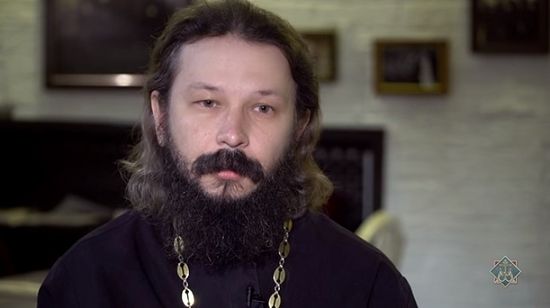



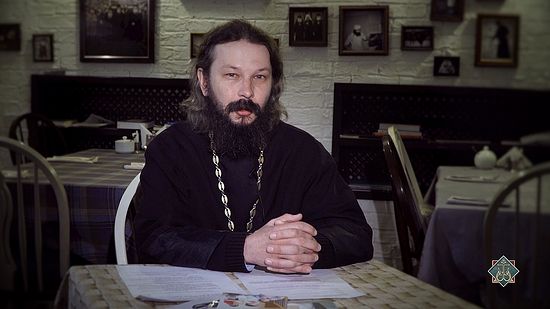




No comments:
Post a Comment